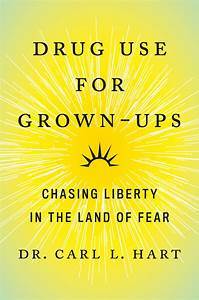Drug Use for Grown-Ups

Drug Use for Grown-Ups
Dr Carl L Hart
Penguin Putnam (2021)
Book Review
Hart, an African American psychology professor at Columbia University, has spent decades researching the effect of illicit drugs on a broad cross-section of users and non-users. Based on this research, he makes a compelling case that all illicit drugs are more beneficial than harmful and should be legalized. In his studies (of cannabis, cocaine, heroin, methamphetamine and psilocybin), small doses of each consistently produced feelings of altruism, empathy, focus and tranquility in nearly all his subjects. They also reported a feeling a greater sense of purpose and meaning and improved sexual intimacy and performance.*
At the same time, Hart cautions that recreational drugs are likely to produce unwanted effects in people with psychiatric illness or in acute crisis. Likewise he also recommends using recreational drugs (and alcohol) in a responsible “adult” way that doesn’t interfere with family, work and social responsibilities.
According to Hart, the US has a long proud history of using opium, cocaine and cannabis and for medical conditions. Jefferson was avid long term drug user for both medicinal and mind altering purposes. Freud was a heavy cocaine user. In the US, the main opioid (opium or morphine) users were middle aged white women, with few adverse effects. Cocaine use was actively encouraged among (Black and white) laborers because it increased their productivity.
Since Nixon first declared a War on Drugs in 1971, its budget has increased from 1.5 to 35 billion, illicit drugs remain as plentiful as ever and the US prison population has grown to over two billion. In 2021 when the book was published, 32 million Americans reported using at least one drug in the past month. Owing to differential police enforcement, the vast majority of people incarcerated for drug possession are Black or Hispanic, while the vast majority of drug users (and dealers) are white.
Marijuana
Extensive research suggests marijuana is beneficial for AIDS wasting syndrome, neuropathic pain, chronic main and spasticity due to multiple sclerosis, Thirty-two states have legalized its use for specific medical conditions. At the same, there is no reliable evidence that it causes brain damage, that it’s a gateway drug to more dangerous drug or impairs reasoning or abstracting thinking (as is frequently claimed).
Cocaine and Crack
Cocaine, the origin of modern lidocaine, was the the first local anesthetic During the 1986-88 crack cocaine hysteria, the majority of crack users were white and for the most part they were offered treatment. Black people who used it were arrested and given five-year sentences.
Opiates
Opiates have long been used medically for treatment of pain. Heroin can be lifesaving n regions with endemic dysentery. Only 1/4 of opioid-related overdose involve a single drug. In 3/4 of case, the opium is contaminated and/or combined with a downers, such as alcohol, a tranquilizer or antihistamine. Fentanyl overdoses are common because naive street users underestimate how potent it is compared to heroin. Hart strongly advocates for free drug safety testing (widely available outside the US), which allows users to ascertain whether their street heroin has dangerous contaminants. The severity of opiate withdrawal (which unlike alcohol withdrawal is almost never fatal) has been grossly exaggerated.
Amphetamine
Contrary to common propaganda, there’s no reliable peer reviewed evidence that amphetamines cause brain damage.
Psychodelics
Hart is highly critical of wealthy “psychonauts” who advocate for legalization of psychodelics (ie their drug of choice). He decries the myth of PCP causing superhuman strength in black males (which is totally unsupported by research), which police sometimes use an excuse to gun down black males. He also advocates for more research into the use of ketamine, psilocybin and LSD microdosing in depression.
In my view, Hart argues very persuasively for the legalization (which would end prosecution of drug dealers). Portugal and Brazil have decriminalized all recreational drugs. However their continued prosecution of drug dealers continues to result in mass incarceration of poor minority populations.
*Hart tried each of these drugs himself and had a similar reaction. He also deliberately put himself through heroin withdrawal, which was fairly benign except for excruciating abdominal pain, which he eventually relieved by snorting 0.5 mg of the sleeping medication triazolam (Halcion). At present he uses heroin (snorting) or alcohol occasionally, finding both protective against the negative health consequences of “negotiating pathology producing environments.” He reports heroin as being particularly helpful in warding off the flu or other respiratory infections.
The Most Revolutionary Act
- Stuart Jeanne Bramhall's profile
- 11 followers



